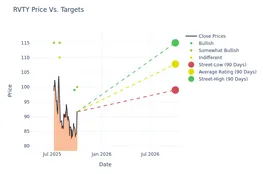What happened to Alibaba (BABAA), the largest e-commerce and cloud infrastructure company in China, this year? Since closing at a record high of $307.84 on Oct. 27, 2020, the company has shed approximately 60% of its value. This decline was largely fueled by a confluence of challenging factors, including intense regulatory scrutiny, heightened competitive pressures, and broader macroeconomic headwinds impacting China’s economic growth. China’s antitrust regulators levied a significant record fine against Alibaba’s e-commerce business in 2021, alongside stricter operational restrictions. These actions directly weakened Alibaba’s defenses against aggressive competitors such as PDD and JD.com. Simultaneously, the post-pandemic slowdown in China’s economic growth curtailed consumer spending, prompting many companies to reduce their investments in Alibaba’s cloud-based services. Collectively, these pressures led investors to believe that Alibaba’s period of rapid expansion was drawing to a close. However, a remarkable turnaround has occurred since early 2025, with Alibaba’s stock price rising nearly 50%. This rally is driven by several key catalysts that investors are closely watching.
Firstly, Alibaba has successfully stabilized its core e-commerce business. While revenue from its flagship Taobao and Tmall marketplaces in China rose only 3% in fiscal 2025 (ending in March), driven by mature growth, the company’s International Digital Commerce Group – encompassing ventures like Lazada in Southeast Asia, Trendyol in Turkey, Daraz in South Asia, and AliExpress for cross-border purchases – experienced a robust 29% revenue increase. This diversification into international markets is a crucial element of Alibaba’s strategy. Secondly, Alibaba’s Cloud Intelligence division has demonstrated impressive growth, rising by 11% in fiscal 2025. This acceleration is largely attributed to the explosive growth in the artificial intelligence (AI) sector, leading more companies to invest heavily in Alibaba’s cloud infrastructure services. A significant development has been the integration of Qwen, Alibaba’s family of large language models (LLMs), into its cloud platform. This move strategically attracts AI-focused customers, transforming Alibaba from a traditional e-commerce leader into a compelling cloud and AI player. The company's expansion of this ecosystem is a key factor in its recent performance.
Furthermore, Alibaba’s financial performance has also improved. Its revenue and adjusted earnings before interest, taxes, depreciation, and amortization (EBITDA) both increased by 6% in fiscal 2025. Considering its enterprise value of 1.69 trillion yuan ($240 billion), the company’s stock appears remarkably undervalued, trading at approximately 2x this year’s sales and 8x its adjusted EBITDA. However, unresolved trade tensions between the U.S. and China continue to dampen investor enthusiasm for Chinese equities. Despite this, Alibaba repurchased 5% of its shares for $11.9 billion during fiscal 2025, reinforcing the argument for its undervaluation. A favorable trade agreement between the U.S. and China could significantly elevate its valuations.
Looking ahead to fiscal 2025 through 2028, analysts project Alibaba’s revenue and EBITDA to grow at a compound annual growth rate (CAGR) of 7% and 11%, respectively. This growth is expected to stem from the continued expansion of its e-commerce and cloud businesses, the broader adoption of its generative AI ecosystem, and increased utilization of its logistics services by third-party clients. Alibaba has also recently proposed a strategic spin-off of its Banma autonomous driving unit, suggesting a potential revisiting of previous plans to separate its cloud and logistics operations through initial public offerings (IPOs). While previous attempts were scrapped due to a challenging market environment and other macroeconomic hurdles, spinning off these units could enhance the company’s cash flow and unlock additional value for shareholders. While Alibaba’s high-growth days may be behind it, the company is anticipated to maintain a stable growth rate over the next few years as its core businesses mature and it continues to identify new avenues for revenue enhancement. Consequently, it's increasingly viewed as a value play rather than a growth stock. The stock’s trajectory through the remainder of 2025 could gradually increase if relations between the U.S. and China improve; however, investors shouldn’t anticipate a return to its previous record highs anytime soon.
























